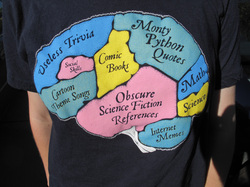 I once heard Maya Angelou say, "When people tell you who they are you should believe them." I'm not sure if she is the originator of the expression, but I will credit her for it anyway. She was, of course, referring to our tendency to want to give people the benefit of the doubt. How many times have you heard someone excuse unacceptable behavior chalking it up to a bad day, stress, or an Irish temper? I used to work in a call center, and we had a manager that was Straight Outa Old School. He was a mean-spirited bully who managed through fear and intimidation. His reign of terror lasted much longer than it should, because with each episode we would shake our heads and say, "Well that's just Tom being Tom." We wanted to believe that deep down he was a really good person who was just a little "crusty." Nothing in his behavior supported that hope, and eventually the organization realized it had to part ways with him. As he was leaving us I thought about all of the careers he had negatively impacted and the number of talented people we lost because of him. What was behind our reluctance to see Tom for who he was? I believe that over time, we refused to see him because we weren't sure what it said about us. Some of us liked Tom. Some of us hung out with him on weekends. If he was a bad guy, and we liked him, did that make us bad? I am thinking about this particularly in light of the 2016 Presidential race. Donald Trump's candidacy has been a display of bad temper, misogyny, racism, and the list goes on and on. Most people felt we were being punked as bit players in some reality television show. But something odd began to happen. People began supporting him in huge numbers. It seemed that Mr. Trump had found a group of people who felt they didn't have a voice in our society. "The Donald" it seemed, was able to stand up and say everything they haven't been able to since they were shoved into the politically correct closet back in the 1980's. "Finally, they opined, someone who can tell it like it is!" I sat back as the months passed, while most people just shook their heads in denial. "How can this be happening?" "How can people be supporting this guy?" Most of these folks believed that his campaign would be short-lived because he was so out of step with the hearts and minds of Americans. Surely, they said, people will come to their senses. But alas, going into the Iowa caucuses Trump was still going strong. And here is where the truth shows up. We want to believe that the Trumps of the world are marginal cave dwellers whose time in our society has passed. We don't want to believe that Trump is who we really are. But if you ask any black person whose been racially profiled, gay person who faced discrimination,or woman who had to deal with a sexist troll at work, this is who we are. It is in fact, who we have always been. We close our eyes to mounting evidence that institutional racism exists, and that the prison industrial system has profited off of the mass incarceration of people of color. When one of our work associates tells us he or she was racially profiled we ask them if the are sure, or if they were just being overly sensitive. Even as we watch Donald Trump dominate the 2016 campaign cycle and discover that the Governor of Michigan knowingly poisoned a poor community in Flint Michigan for profit, we are still in denial. http://cnn.it/1SDpWNw We want to believe that we are a country that is beyond this type of behavior. We want to believe that we live in a free and just society. But how many Trumps will it take for us to realize...this is who we really are? Unless and until we admit and really deal with it, we will keep making excuses for our behavior. Inclusion365 Tip #12 I won't make excuses for bad behavior when I see it. I will call it what it is, and deal with it openly.
1 Comment
 In my role as Chief Diversity Officer for my company, I recently attended a learning lab about unconscious bias. The theory of unconscious bias is that we human beings are not bad people we just hold unconscious beliefs about various social groups. It’s how our brains work. It was interesting material, with just the right mix of neuroscience and practical application to keep me engaged as I thought of ways to apply this learning in my organization. At one point, the instructor was explaining implicit association; the series of conclusions our brain automatically makes when it senses danger. For example, we don’t have to touch fire every time we see it to know that it will burn us. As a way of demonstrating his point, he told us a story about flinching when he saw a young African American man walking toward him. On reflex, he locked his car door. The young man saw him, and there was an awkward moment that passed between the two of them. His brain saw this young man as a threat, he posited, because of images on the nightly news. As I sat there in that class listening to the story and the conversation that followed, I found myself fighting back tears. While, they were talking about nameless, faceless young men I was thinking about my 23 year old nephew. I remembered potty training him and teaching him how to ride his bike and tie his shoes. I thought of all of the times we cuddled under a blanket and watched Monday Night Football after consuming a heaping plate of home-made nachos. I thought about helping him with his homework and beaming with pride at his high school graduation. And I thought about him now. At six feet two inches tall and 250 pounds, he is the stuff of some people’s night mares. To me, he is a kind and thoughtful young man. I sat there fighting tears because I have witnessed my nephew, in his hoodie, walking to the corner store for a bag of chips and a soda. I now realize that there are people who would feel justified in suspecting he was a criminal simply because of the color of his skin. I have been a vocal champion of diversity and inclusion for years, but on this day I found myself speechless while tears streamed down my face. We can blame our brains and distance ourselves from the reality of how hurtful our actions can be, but that won’t make it right for my nephew or the thousands of young men like him who find themselves under constant suspicion. While it is true that I don’t know every young African American man I see walking down the street, I do know the one who lives in my house. That is enough for me to challenge my bias, and give the rest of them the benefit of the doubt. Inclusion 365 Mission #8 I will always challenge my internal biases, I will not use the media, society, or my brain as an excuse to prejudge people or circumstances  One of the continuing challenges in building a multicultural workplace, is actually getting multiple cultures into the workplace. It seems the conversation around diversity is shifting once again to reflect the global nature of business and the number of companies who now have presence in many countries around the world. My company is not any different. The last time I counted we had 23 countries represented in our various U.S. work locations. Transferring talent around the globe is something we do quite frequently and is actually a strong recruiting position for us. I have noticed that we have no trouble embracing our European colleagues and even our Latin colleagues, but alas, the same can not be said of our domestic "home grown" cultures. You know what I mean. When we hear a German accent or a British accent, we immediately think "Wow. How cool!" We assume the speaker has something we don't. And, even if we can't understand a word they are saying, we somehow feel that they are in some way superior to us because after all, English is not their native tongue. How special are they for butchering the English language? Applause, applause. Here is what I have also noticed. When the accent is from say, Alabama and not Berlin, the assumption conferred on the speaker is not one of superiority, but inferiority. When the speaker doesn't have a funky European sense of style, but rather a funky head of hair, we are suddendly not so enthralled with their "difference." Why is this? My view is that as Americans, we still have not resolved our bias that tells us that people of color are innately inferior. And when we hear certain accents, including American regional dialects, we turn off. And thus, the challenge I have in attracting and retaining a multicultural workforce (that is not European). We recenty did a round of recruiting for our college graduate program. Included in our recruiting tour were several Historically Black Colleges and Universities. We met some wonderfully gifted, intelligent, and bright students who fit our hiring criteria. The first step in the screening process what the resume and college GPA. The second step in the screening process is the phone interview. Here is where the bias creeps in. Of the resumes we deemed qualified, only 3% of those students were still considered worthy after the phone interview. Really? How do you go from being brilliant on paper to utterly unattractive after a phone conversation? In another instance, I was attempting to place summer interns through the INROADS program, which focuses on placing minority students in interships withing corporate america. The resistance I met from some of the hiring managers was mind blowing. We are takling about freshmen and sophomores in college. And yet, the screening criteria that these students were held to was for experienced professionals. I kept getting excuses like, " well, they don't really have the experience I need." Really? What kind of experience do you need to be a summer intern? What exactly was missing? " Well, they have never written any code..." Have your other summer interns written code or analyzed P&L statements, or created marketing campaigns? How many 18 year-old college students have? It' almost as if, if you are a person of color, you have to be exceptional just to walk in the door. This is an impossible standard, and is the reason we have so many "firsts" who end up being the "only" and the "last." I would challenge anyone who is responsible for recruiting and hiring to pause a beat before disqualifying a candidate. Ask yourself; if this person was white from the University of Michigan, would I be so reluctant to bring them into the organization? Would I be so concerned with the lack of depth of their experience to fill and entry-level or internship position? We can't build a pipeline of multicultural talent if our funnel is so narrow that it doesn't let anyone in. As long as we are allowing our bias to cloud our perceptions of people, we will continue to have only the fortunate few who somehow manage to transend our prejudices and racial bias to grace the hallowed halls of our institutions. I have always agreed that diversity is more than race and gender. I love discussing generational differences, and working effectively across cultures, but we can't just forget about race and gender. We can't file it away as something we have resolved, when there is evidence everywhere in our society that indicates that clearly we have not. Inclusion 365 mission #7 I will not accept that black and brown people have to be exceptional to get an opportunity. I will make an effort not to require more those of the minority than I do from members of the dominant majority.  I recently attended an Unconscious Bias Learning Lab in Silver Spring Maryland run by Howard Ross of Cook Ross, Inc. If you ever get the chance to experience it, I highly encourage you to do so. I won't say it was mind blowing because that is hyperbole, and working in German company for the past 18 years I am sensitive to the way other cultures react to our American tendancy to exagerate. I will say it was enlightening. For years we have approached the discussion of diversity by lining people up into two camps. On one side we have the poor, oppressed, downtrodden, under- represented, under-priveledged minority. On the other side we have the priveledged, mean-spirited, bigoted, racist, ageist, sexist majority. Good vs. Evil. Simple. Classic. False. The study of Unconscious Bias looks at way the brain uses "mental associates that are so-well established as to operate without awareness or without intention or without control." ( Project Implicit, Harvard University) Bias stems from our automatic tendency towards fight or flight; it keeps us alive. Bias helps give our world order and saves us from having to think through every decision or action. If I have touched a hot stove and burned myself, I don't have to ask myself every time I see a hot stove whether or not I should touch it. I know better. My unconscious mind is programed to processes that informatin so that I don't have to think about it. The problem is, when that programming causes me to have bias toward members of groups, I behave in ways and make decisions that impact people...and I may not even be aware of it. In fact, bias often conflicts with concious attitudes and intentional behavior. How many times have you been appalled at the words that came out of someone's mouth that you would have previously described as open-minded or fair? During the last national political campaign I saw a bit on The Daily Show where people at the Democratic Convention were patting themselves on the back for being the party of inclusion, but they were captured on camera saying things like..." We welcome everyone except those tea-baggers!" Hillarious! Now, this new way of looking at human behavior does not in any way attempt to excuse those who are intentional and deliberate about their "ism." Those people know who they are and so do we. This is about helping us understand how it can be that organizations have had diversity initiatives in place for the past 20 or 30 years and still have a majority of white men in almost every leadership position. I don't think it is a coincidence that only 14% if men in this country are over 6 feet tall, while 60% of CEO's are over six feet tall. Somehow, we got it into our heads that tall white men were fit to lead and other's weren't. Somehow we reflexively attribute some value to being tall that has nothing to do with a persons competencies. We have a tendency to look for what confirms our beliefs and ignor what contradicts our beliefs all the while ignoring the truth. Recently, my boss and I were discussing our efforts to bring more ethnic minority talent into the organization at the management level. We interviewed a candidate I thought was a solid choice. The other people involved in the process kept hesitating and asking questions, picking at the persons background and judging his "fit". I said to my boss, " You have to be exceptional if you are a black person or a woman if you want to get into this place. Only exceptional minorities make it here. Which is funny becasue there are a whole lot of mediocre white men running around." ( my boss and I have these candid conversations all of the time because we have built that kind of realtionship over the years. ) He laughed and said. "It's not fair...but you are right!" His is correct. It isn't fair. So, we hve made a decison. We are going to expose our HR consultants and Recruiters to this unconscious bias training, because I think understanding how bias impacts our decisions around talent management and recruiting will be critical in changing the demographics of our organzation. It isn't about being good people or bad people...it's about being informed and aware people. Inclusion 365 Mission #5 I will pay attention to how I am treating people and check to see if my mind is "filling in the blanks" based on some assumption I am making based on past experience or programming. I will challenge my biases, both conscious and unconscious and be honest with myself.  The Holiday season is one that is often fraught with danger for Chief Diversity Officers. Some topics are innately emotional for people. Money is number one, family and children are number two and religion is number three. During the months of November and December the workplace becomes an emotional minefield where normally rational people become hyper sensitive and dogmatic. In matters of diversity, we often speak in terms of majority culture vs. minority culture. Generally the view is, if you are part of the majority culture the onus is on you to be more sensitive and appear overly accomodating ( inclusive) of other cultures. We expect men to behave themselves when we introduce Women's leadership training and we expect our white colleagues to understand why we have executive mentoring programs for ethnic minorities. And, for the most part, I would say they do. However, when it comes to Christmas...all bets are off. When it comes to the intrusion of religious inclusion in the workplace, Christians seem more unwilling than others to embrace the high road of diversity. They don't understand why their colleagues would object to a Christmas Tree in the lobby, or playing Christmas Carols over the sound system. "It's Christmas!" they declare. " and America is a Christian nation." Well, the problem is this. It is also Hanukkah (Jewish), Ashura (Islamic/ Muslim), St. Nicholas Day (Europe) Boxing Day, ( Canada) and Kwanza ( African American), etc. How does and organization that is comiited to building an inclusive workplace handle the question of religious celebrations in the workplace? Well, in my opinion, it has to be all or nothing. If you recognize one religion, then you have to provide the space for the recognition of all religions. If an individual wants to hand out chocolate santas to his co-workers in honor of St. Nicholas Day or place a minorah on her desk, then other employees should be allowed the same freedom. The organization, however, should not be seen as promoting one religion over another. I have advised my organization to decorate our hotel lobby in very festive holiday decor, minus the Christmas Tree. As an individual, I will be celebrating Christmas. I will say "Merry Christmas" to people I encounter in stores. I will personally always understand that, for me, Jesus is the reason for the season. I will also, however, listen intently while my Hindu colleagues tell me the details of Ashura, and I will enthusiastically play a game of Dreidel if invited to participate by my Jewish colleagues. Inclusion 365 Mission#2 I will honor my religious heritage and beliefs while respecting the religious heritage and beliefs of others. I recognize that the country I live in, is a great quilt made up of unique and varying elements, none more important than the other. I will remember to hold fast to my own beliefs and convictions without diminishing the beliefs and convictions of others.  The morning after the 2012 Presidential election, I was sitting in an office with a some of my colleagues. Inevitably the conversation turned to the election results and speculation about how the Republicans could have mis-judged the sentiment of the country and lost the election so conclusively. At one point, one of my colleagues, who is a white male who grew up in South Africa, began recounting tales of people in his neighborhood who consistently say disparaging things about ethnic minorities. He began to explain how at first he would offer rebutals but over time had given up trying to influence his peers. At some point in the conversation, some one said "Well, we are all racist." To which I replied, "NO. We may all have biases, but we are not all racists." It dawned on me in that moment, that the rhetoric surrounding race is this country has become so twisted and convoluted that people who would normally be change agents and advocates for inclusion, just throw up their hands and say there is nothing we can do. But I would like to examine this belief. Racism, according to Websters dictionary is " a belief that race is the primary determinant of human traits and capacities and that racial differences produce an inherent superiority of a particular race." Bias, is defined as, "an inclination of temperament or outlook; especially: a personal and sometimes unreasoned judgment : prejudice." If someone has an affinity for a political candidate becasue they feel a connection with the candidate based on a particluar trait or characteristic, that would be a bias. Also, if you felt you could not connect with a political candidate because of a particular trait or characteristic, that would also be a bias. If white voters, for example, felt that Mitt Romney was more like them and more likely to view the world the way they do, that would be an example of a bias. If those same voters, decided that President Obama was unfit to lead them because black people are inferior and have no right to hold the office of President, that would racism. Both of those examples have an element of race, but only one of those examples is racist. If black voters felt a sense of pride about Barak Obama being the first bi-racial President, and felt that he was more likely to understand the issues that affect them, that would be an example of bias, not racism. If those same voters simply revelled in the irony that a black man is President of this country given its history of instituionalized racism and bigotry, that would also represent an unreasoned judgment, but it doesn't amount to racism. Everything that is racial isn't racist, and I think we would do ourselves a huge favor by recognizing this and stop using the words "racist" and "racism" when what we are really referring to is prejudice. Why parse words? I believe these distinctions are important and we need to be precise in the language we use because words have meaning and they impact our relationships and our interactions with others. I want to mean what I say about issues of race, gender, ethnicity, sexual orientation etc. I want to have credibility and be thoughtful in my communication. Being loose with our vocabulary blurs the lines and prevents honest dialog. Inclusion365 Mission # 1 I will say what I mean when I discuss issues of diversity, and I will not allow my biases and prejudices to to lead me to conclusions about the character and abilities of others. (that would be racist) |
AuthorI am a Diversity practitioner wondering if it is possible to practice what I preach and live by the principles of diversity and inclusion everyday. Archives
May 2017
Categories
All
|
 RSS Feed
RSS Feed